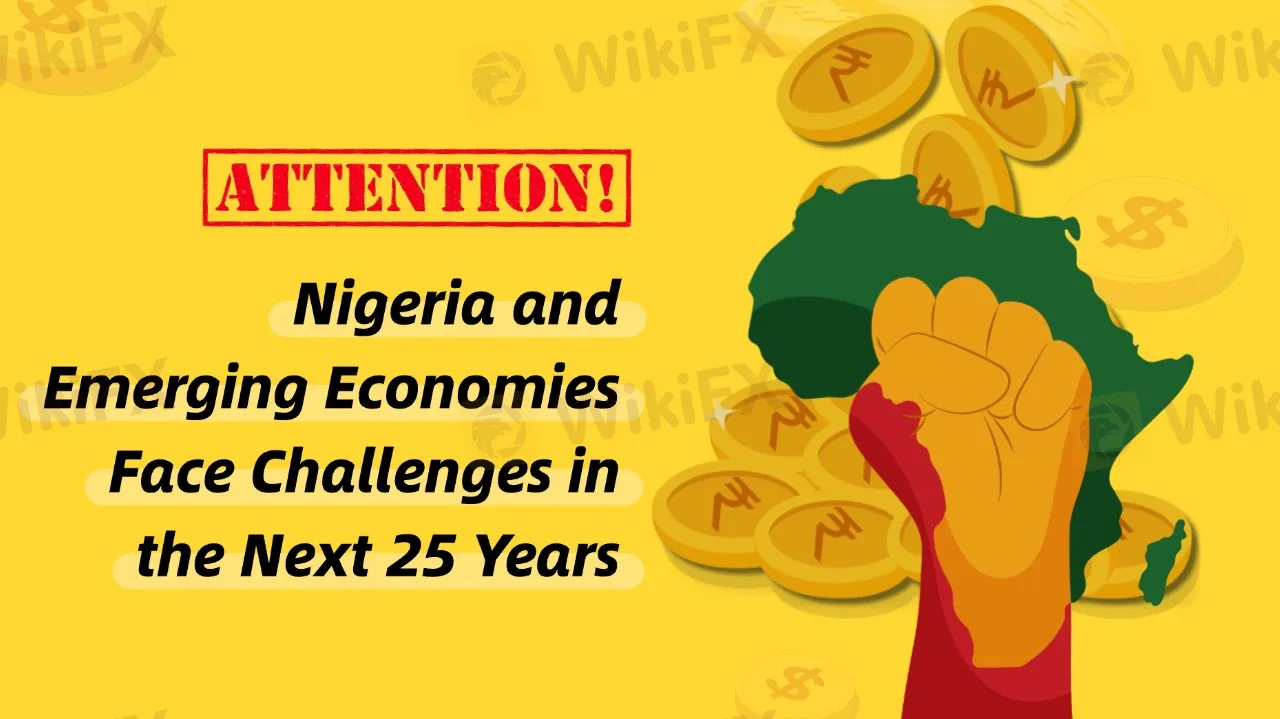简体中文
繁體中文
English
Pусский
日本語
ภาษาไทย
Tiếng Việt
Bahasa Indonesia
Español
हिन्दी
Filippiiniläinen
Français
Deutsch
Português
Türkçe
한국어
العربية
Nigeria and Emerging Economies Face Challenges in the Next 25 Years
Abstract:Nigeria continues to face significant challenges, including high debt, currency devaluation, and rising prices. On top of that, climate change-induced weather disasters and food security issues have made the economic outlook less optimistic.

Although Nigerias economy is expected to see a slight recovery in 2024, with growth potentially reaching 2.2%, this growth rate remains lower than that of other African countries. While increased oil production and improved power supply bring some good news, the country's broader economic situation remains fragile.
Globally, developing economies are becoming increasingly important. According to the World Bank, these countries now account for 45% of global GDP, up from just 25% in 2000. However, their growing importance comes with rising challenges. Many external forces that once supported their development are waning, and domestic reform processes have not kept pace. Meanwhile, developing economies continue to lag behind developed countries in terms of per capita income, income inequality, and productivity, leading to imbalances in both their social and economic systems.
Looking ahead, Nigeria and other developing economies face even more severe challenges in the next 25 years. These nations will continue to bear heavy debt burdens, with economic growth remaining sluggish. Moreover, the impact of climate change, such as extreme weather events and natural disasters, will put additional pressure on vital sectors like agriculture and energy. At the same time, slowing global investment and weak productivity will further hinder economic growth. With the population continuing to rise, providing more employment opportunities and improving living standards will be urgent issues to address.
To tackle these challenges, Nigeria and other developing countries will need to adopt new strategies. First, domestic economic structures must be reformed, particularly in tax and fiscal policies, to promote economic diversification. Increased investment in infrastructure, education, and technological innovation will also be critical to boosting private investment and productivity. Furthermore, developing economies should strengthen trade and investment partnerships with other nations, establish strategic alliances, broaden markets, and reduce trade barriers to enhance their competitiveness. Finally, responding flexibly to global economic uncertainties and implementing sound macroeconomic policies will be crucial to maintaining stability and achieving sustainable growth.
In conclusion, despite the significant challenges faced by Nigeria and other developing economies, with timely policy adjustments, innovation, and international cooperation, there is still a chance to achieve economic growth and sustainability in the next 25 years.

Disclaimer:
The views in this article only represent the author's personal views, and do not constitute investment advice on this platform. This platform does not guarantee the accuracy, completeness and timeliness of the information in the article, and will not be liable for any loss caused by the use of or reliance on the information in the article.
Read more

Common Tactics Used in Online Trading Fraud Today
Know the top online trading scams of 2025, from fake apps to pump-and-dump tricks. Simple tips to spot and avoid them, keeping your money safe in this easy guide.

RM1.29 Million Lost in ‘C Baird VIP’ WhatsApp Scam
A 43-year-old company auditor and subcontractor in Malaysia became the latest victim of an elaborate investment scam after losing RM1.29 million to a fraudulent scheme promoted via WhatsApp.

U.S. March ISM Manufacturing PMI Released
The U.S. March ISM Manufacturing PMI data shows that manufacturing has contracted for the first time, and investors should pay attention to future changes and impacts on the sector.

Breaking News! Forex Inflows Surge to $17 Billion
Nigeria's foreign exchange inflows saw a significant increase in the fourth quarter of 2024, reaching $17.39 billion. This growth reflects strong foreign investments and export revenues, bringing new confidence to the market.
WikiFX Broker
Latest News
FCA Warns Against 10 Unlicensed or Clone Firms
CySEC Warns Against 14 Unlicensed Investment Websites
Top Currency Pairs to Watch for Profit This Week - March 31, 2025
Will natural disasters have an impact on the forex market?
Philippines Deports 29 Indonesians Linked to Online Scam Syndicate in Manila
Exposing the Top 5 Scam Brokers of March 2025: A Closer Look by WikiFX
Gold Prices Climb Again – Have Investors Seized the Opportunity?
Webull Launches SMSF Investment Platform with Zero Fees
Australian Regulator Warns of Money Laundering and Fraud Risks in Crypto ATMs
The Withdrawal Trap: How Scam Brokers Lure Victims into Paying More
Currency Calculator







